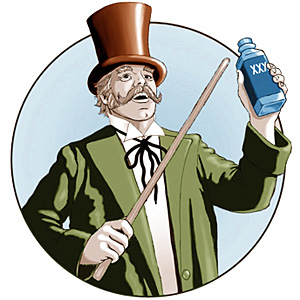Food is 21st century snake oil.
 And shopping for food can be so confusing.
And shopping for food can be so confusing.
Natural, organic, local, antioxidants, welfare-friendly, whole wheat made predominantly with white flour, hormone-free, hucksterism of whatever kind.
Juliana Barbassa of Associated Press reports today that a disagreement among poultry producers about whether chicken injected with salt, water and other ingredients can be promoted as "natural" has prompted federal officials to consider changing labeling guidelines.
The U.S. Department of Agriculture had maintained that if chicken wasn’t flavored artificially or preserved with chemicals, it could carry the word "natural" on the package.
But the agency agreed to take another look at its policy after some producers, politicians and health advocates noted that about one-third of chicken sold in the U.S. was injected with additives that could represent up to 15 percent of the meat’s weight, doubling or tripling its sodium content. Some argue that could mislead or potentially harm consumers who must limit their salt intake.
 The USDA’s Food Safety and Inspection Service plans to issue new proposed rules this fall.
The USDA’s Food Safety and Inspection Service plans to issue new proposed rules this fall.
Perdue, the nation’s third largest poultry producer, is among those pushing for a change. The company has joined a group called the Truthful Labeling Coalition, which has hired a lobbyist and launched an advertising campaign.
The two largest chicken processors, Pilgrim’s Pride and Tyson Foods, are among those that affix "natural" labels to chicken injected with extra salt and water.
A buyer perusing the chicken counter at a San Francisco supermarket agreed.
Muembo Muanza, 30, said he read the label and considered the price but never thought to check the salt content when buying fresh chicken.
"If it says natural, I expect it to be all natural – nothing but chicken," he said.
I’d be more interested if food-types would start marketing based on microbial food safety.


.jpg) To more proactively tackle food safety problems, FDA should implement a risk-based approach
To more proactively tackle food safety problems, FDA should implement a risk-based approach She then introduced herself as a veterinary student at Kansas State University who’d seen me lecture a few weeks ago. And then she asked me if I’d seen the story about the fake U.S. Department of Agriculture veterinarian.
She then introduced herself as a veterinary student at Kansas State University who’d seen me lecture a few weeks ago. And then she asked me if I’d seen the story about the fake U.S. Department of Agriculture veterinarian..jpg) unsafe slaughterhouse practices, letting suspect operations continue despite public health risks.
unsafe slaughterhouse practices, letting suspect operations continue despite public health risks..jpg) CBS Radio called about 5 a.m. for comment – they’re so polite, they always e-mail first to see if I’m awake so they don’t wake the household. As soon as I said, yeah, let’s do it, 1-year-old Sorenne awoke so I missed the first call to change a diaper and provide 8 ounces of milk. But, the reporter at CBS in N.Y. agreed it was a good call, kid first, then radio soundbites, in which I said something along the lines of, I don’t know anything about the specifics of these cases, but the best slaughterhouses won’t be held hostage by a dude with a video camera, and will get way, way out in front of the minimal standards required by USDA. Maybe it’s too early and I’m still dreaming.
CBS Radio called about 5 a.m. for comment – they’re so polite, they always e-mail first to see if I’m awake so they don’t wake the household. As soon as I said, yeah, let’s do it, 1-year-old Sorenne awoke so I missed the first call to change a diaper and provide 8 ounces of milk. But, the reporter at CBS in N.Y. agreed it was a good call, kid first, then radio soundbites, in which I said something along the lines of, I don’t know anything about the specifics of these cases, but the best slaughterhouses won’t be held hostage by a dude with a video camera, and will get way, way out in front of the minimal standards required by USDA. Maybe it’s too early and I’m still dreaming. Sounds familiar.
Sounds familiar. Agriculture Undersecretary for Food Safety has taken on histrionic tones.
Agriculture Undersecretary for Food Safety has taken on histrionic tones. .jpg) money, but the resources and time spent lobbying the politicians and bureaucrats seem to have a low return on investment.
money, but the resources and time spent lobbying the politicians and bureaucrats seem to have a low return on investment. last year. What stands out is that the U.S. Department of Agriculture initially refused to match suppliers with positive test results as part of an analysis of 146,000 tests for bacteria including salmonella and E. coli.
last year. What stands out is that the U.S. Department of Agriculture initially refused to match suppliers with positive test results as part of an analysis of 146,000 tests for bacteria including salmonella and E. coli.(1).jpg) That sounds eerily familiar to what happened in the
That sounds eerily familiar to what happened in the I don’t know if it works so I asked Chapman. He said the video doesn’t spend enough time on deli meats, the food that risk assessments have shown was much riskier than others. He also said it’s not bad, but somewhat patronizing, but he’s also not a pregnant woman.
I don’t know if it works so I asked Chapman. He said the video doesn’t spend enough time on deli meats, the food that risk assessments have shown was much riskier than others. He also said it’s not bad, but somewhat patronizing, but he’s also not a pregnant woman.